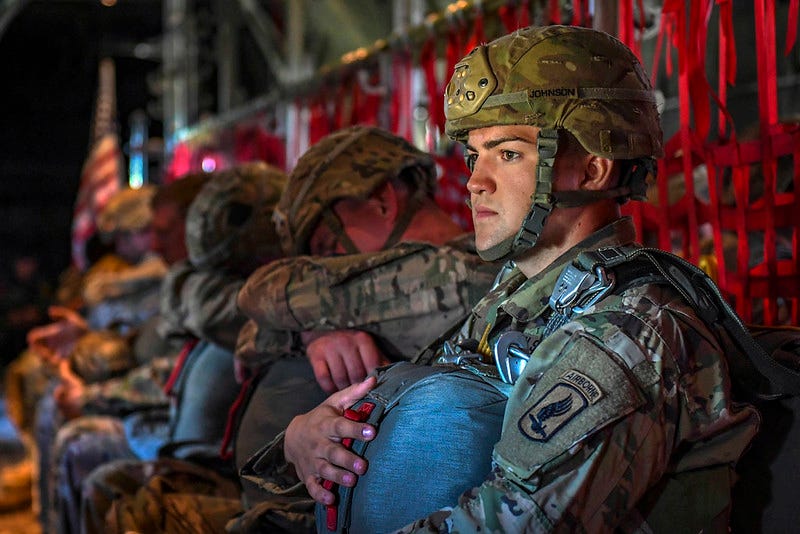Military Mental Health Checkup: The Failure of Individualized Responsibility for Servicemember Healthcare
By Jeffrey C. Arnold Jr.

Eighteen veterans and active-duty servicemembers die by suicide every day. The rate of suicide among the veteran and active-duty population is more than one and a half times that of the average American. With mental health treatment so highly stigmatized in the military, self-referral will not be the magic bullet to ameliorate this failure to address military mental health adequately. Currently, the military requires a Periodic Health Assessment (PHA) annually, consisting of a survey and visit to a medical provider. Like this PHA, the military should institute an annual psychological health check-up or Periodic Mental Health Assessment (PMHA) in much the same way it mandates the PHA. This PMHA would counter stigmatizing regulations and adverse career consequences which exacerbate mental healthcare stigmatization.
The PHA is a two-part online and in-person questionnaire that addresses topics from substance use, injury, and even mental health. The online questionnaire aims to identify areas of concern for the servicemember's Primary Care Manager (PCM) to address during the in-person portion of the PHA. While the PHA attempts to address mental health concerns through the questionnaire, the stigmatized nature of mental health leads to servicemembers consistently underreporting areas of possible concern.
Lacking any flagged answers indicating possible areas of concern, PCMs will only provide a cursory physical examination. Even when areas of concern exist, studies have shown that two-thirds of those flagged for severe alcohol use did not receive a referral for a behavioral health follow-up during their PCM visit. The PCM's failure to dig deeper into possible mental health concerns not immediately indicated on the PHA questionnaire constitutes a failure to adequately address psychological health concerns. A face-to-face interaction with a mental health provider would offer a second, more professionally oriented examination, possibly identifying physiological concerns that biometric markers may not indicate.
Mandating an annual in-person visit with a mental healthcare provider, like the second in-person requirement for the PHA, would substantially decrease the stigmatization of increased treatment for psychological ailments. This annual mental health assessment is necessary as lacking any similar interaction with a specially-trained mental health provider, indications of trauma, unhealthy coping mechanisms, or mental illness cannot be evaluated. Over time, the routine visits to mental health providers and the normalization of these services like the PHA will transition mental healthcare from something culturally stigmatized toward greater normalcy. Progressive identification and treatment of behavioral health concerns will provide those servicemembers transitioning from military service the tools necessary to address their mental health proactively.
Recent research surrounding behavioral health in the military focuses on two elements: anonymizing treatment and creating mechanisms to incentivize utilization. However, these strategies present a paradox, as the anonymization of an activity indicates the activity is taboo, while the drive to increase utilization seeks to increase involvement in the "taboo" activity. Anonymizing mental health treatment reinforces the false notion that it is something of which to be ashamed.
Furthermore, stigmatizing regulations and adverse career consequences exacerbate mental healthcare's taboo in the military. A RAND study identified military regulatory stigma over 200 times, including stigmatizing content such as negative terminology, implied incompetence, limitations of privacy, and non-mental health professionals dictating fitness for duty.
Rather than working to anonymize behavioral health treatment, mandating an annual in-person mental health check-up, or PMHA, normalizes treatment and illustrates commitment to Servicemembers' holistic health needs. Additionally, the PMHA would expand the concept of readiness to meet the demands of regulations governing medical readiness.
The individualization of responsibility coupled with the warrior mentality, valorizing stoicism and the internalization of pain cause deep internal wounds that fester if untreated by adequate mental healthcare. This is the origin of the military's doctrinal stand: that the responsibility for health maintenance lies with the servicemember. This worldview mimics a consistent thread within the American psyche which places the burden on the individual for institutional failures priced at 18 Servicemembers a day.
Combat changes a person; the stress of military service changes a person. America cannot expect servicemembers to emerge from the fog of war without some level of trauma requiring treatment. Instead, we should assume that every servicemember needs mental health treatment due to the structurally-embedded high levels of stress at every point in military service. Treatment should be the baseline, not the exception, to ensure a reduction in military and veteran suffering.
The military needs to normalize mental health treatment as preventative care rather than reactionary care. The normalization of mental health treatment can only be achieved through proactive and consistent emphasis on destigmatization. The PMHA separate from the PHA and requiring an in-person visit with a mental healthcare provider would bridge the gap between behavioral healthcare services and the servicemembers who are dissuaded from utilizing those services by regulatory and cultural stigma.




